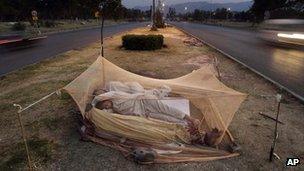Malaria progress threatened by funding, says WHO
- Published

The WHO said if netting provisions fell, malaria could "bounce back"
Recent gains in the fight against malaria could be reversed because funding has stalled, the World Health Organization (WHO) has said.
Its latest World Malaria Report says 1.1 million lives were saved in the past decade but that the expansion in funding from 2004-09 halted in 2010-12.
Less than half of the $5.1bn (£3.1bn) needed was spent last year.
The WHO's latest figures - for 2010 - show some 219 million people were infected, with 660,000 people dying.
'Precarious situation'
The WHO said in a statement that the plateau in funds meant "that millions of people living in highly endemic areas continue to lack access to effective malaria prevention, diagnostic testing, and treatment".
Its report, external said the supply of "life-saving commodities" - such as long-lasting insecticidal nets and indoor spraying programmes - had slowed.
The report said 50 countries were on track to meet targets for cutting malaria cases but that these countries only represented 3% of malaria cases.
Fourteen nations account for an estimated 80% of malaria deaths and Robert Newman, director of the WHO Global Malaria Programme in Geneva, said these high-burden countries were "in a precarious situation and most of them need urgent financial assistance".
Lead report author Richard Cibulskis said: "We need to make sure that we continue the investments in the control measures that we have.
"If we don't do that, malaria will bounce back. As soon as you take bed nets away, malaria will come back. If you stop indoor residual spraying, it will come back, and with a vengeance."
- Published31 October 2012
- Published18 October 2011
- Published4 August 2012
- Published22 May 2012